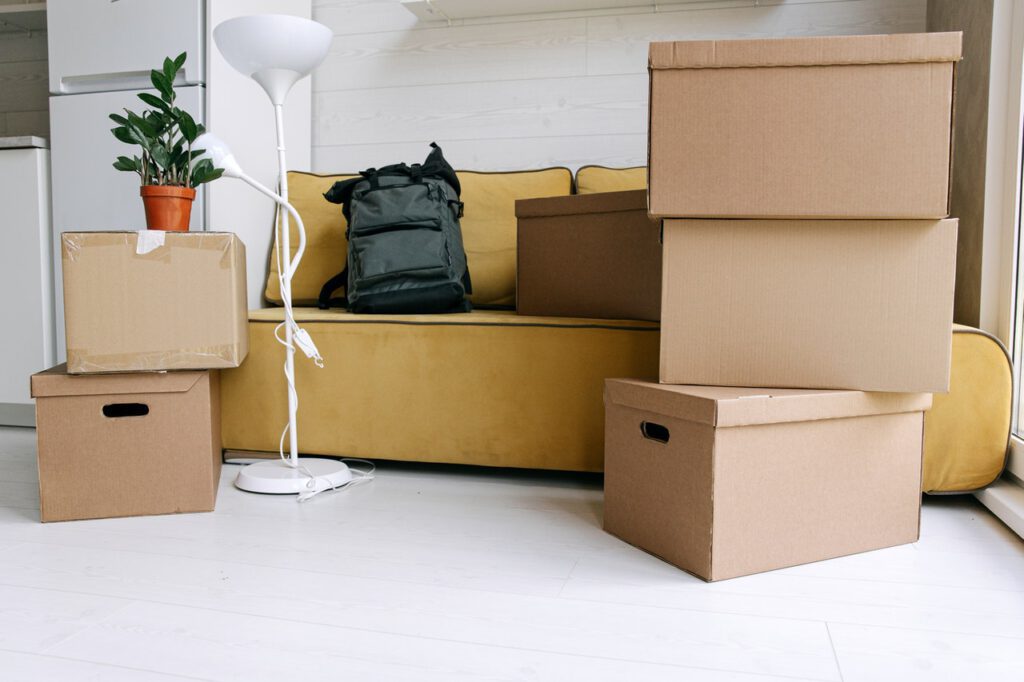If you’ve done any research on renting in Holland (and since you’re here, we assume you have!), then you’ve probably encountered some kooky things about renting in the Netherlands or been daunted by the housing shortage.
As an international, there certainly are a lot of things to keep track of when finding a place to live out your Dutch dream — here’s how you can navigate the rental market in the Netherlands like a pro!
- 🏙 Types of rental properties in the Netherlands
- 🔎 Finding a place to rent in the Netherlands
- 💶 Costs of renting in the Netherlands
- 🛠 What’s included when you rent a place in the Netherlands?
- ✍️ Rental contracts in the Netherlands
- 🙅♀️ How to deal with rental conflicts in the Netherlands
- 🗣 Useful Dutch terms for renting a room, studio, or apartment in the Netherlands
- 🤔 Renting a room, studio, or apartment in the Netherlands: frequently asked questions
🏙 Types of rental properties in the Netherlands
You may be dreaming of a canal house, a modern apartment, or a typical Dutch terraced house — or maybe a houseboat is more your style. 😉
The Netherlands has plenty of different housing options to suit you (and your budget!).
Renting a room in the Netherlands: ‘huisgenoten’ and ‘gezelligheid’
This is a popular option with students and new graduates, but also those who just want to keep their monthly rent to a minimum and love to socialise.

In the Netherlands, renting a room typically means you’ll have your own bedroom (the size will vary between and within houses) and share a kitchen and bathroom. Sometimes, there’ll also be a gezellige living or common room where you can hang out with your flatmates (huisgenoten).
👍 Perfect for: Singles, students
💰 Expect to pay: €400-€1000
Tip: If there’s a sink in your bedroom, don’t be weirded out! Having a sink in the room is quite common in the Netherlands (and you’ll wonder how you ever survived without it!).
Renting a studio in the Netherlands: a small space of your own
A studio is an apartment that doesn’t have a separate bedroom. Instead, your sleeping and living area is combined, and you’ll typically have your own kitchen and bathroom. It’s a great option for people who prefer their own space — but are still on a budget.
👍 Perfect for: Singles, couples
💰 Expect to pay: €600-€2000
Renting an apartment in the Netherlands: a homey feel
Renting an apartment in the Netherlands can be perfect for couples, families, or a group of friends who want to rent together. If you choose to rent an apartment, you can also consider sub-renting the rooms! (Just make sure to check the contract conditions with your landlord first.)
Naturally, the size of apartments and number of bedrooms in the Netherlands can vary a lot — and so will the prices.
👍 Perfect for: Couples, families, groups of friends, or sub-letters
💰 Expect to pay:
- €1400-€2500 for a one-bedroom
- €1700-€3000 for a two-bedroom
- €2000+ for more than three bedrooms
Renting an ‘anti-kraak’ property in the Netherlands: short-term and cheap
First things first, it’s not as bad as it sounds. Anti-kraak means “anti-squat” in Dutch and is a concept developed to prevent squatters from occupying empty buildings. The buildings rented out as anti-kraak can be everything from old offices to general apartment blocks to houseboats (score!).
Living in an anti-kraak is almost guaranteed to be the cheapest way to rent in the Netherlands (sometimes your monthly rent can be as low as €150!).
However, cheap living also comes with a price. Living in an anti-kraak means you won’t have the same rights as a regular tenant and can be sent to the street with very little notice.
If you’re looking for something long-term, anti-kraak may not be for you. But if you don’t mind moving around — and want something heel goedkoop (really cheap) — anti-squat may be the way to go!
Renting a house in the Netherlands: family bliss
One thing you don’t see a lot of in Dutch cities is free-standing houses (vrijstaande woningen), so if you want to rent one of these bad boys, you might have to opt for the suburbs — and be prepared to pay big bucks.
Some other, more common, house rentals include terraced houses (or row houses for our American readers), known in Dutch as rijtjeshuisjes. Semi-detached houses (twee-onder-een kap-woning) are also a great option for families wishing to rent in the Netherlands.
👍 Perfect for: Couples, groups of friends, families
💰 Expect to pay: €1500+
🔎 Finding a place to rent in the Netherlands
After you’ve determined what kind of property you’d like to rent, the big question becomes, “how do I find somewhere to rent?”. Unfortunately, this is where it becomes tricky.
The first thing you should do is familiarise yourself with the red flags for housing and rental scams. The housing shortage has primed the market for people seeking to scam others out of thousands of euros, so beware. Keeping that in mind, let’s find you a place, shall we?
Using Dutch rental agencies and real estate agents
Using a rental agency or a real estate agent is the safest way to ensure you’re not being scammed (except for the high, and sometimes illegal, agency fees 🙃). In the Netherlands, there are three different ways of doing this.
- Using a real estate agent (makelaar) by looking through the listings on a page like Funda. A tool like RentSlam can also help as it does the search for you.
- Utilising a rental agency (verhuurbureau) which specialises in rental properties for internationals. These are usually located in large or student cities and have their own houses that the agency typically owns. The properties they list are often furnished or semi-furnished.
- Hiring a rental real estate agent (makelaar) specifically to help you find a rental property. If you decide to hire a real estate agent, you can expect to be guided almost every step of the way on your Dutch rental journey — from property inspection to reading over the contract and advising you on utility providers.
If you take the last option, a makelaar offers expert knowledge and an ever-watching eye on the market. This can come in handy because you have to act fast to lock down a place in most Dutch cities.
However, the service isn’t cheap: you can pay anything from a few hundred euros to a full month of rent for their services. You’ll likely also need to provide various forms of identification and proof of income.

Online portals and social media
It’s the 21st century, baby! Meaning online portals and social media could be your best friends during your search for a place to rent in the Netherlands.
Some popular online portals with English websites include:
Social media can be a godsend, especially for those looking to rent a room, studio, or small apartment. In the Netherlands, some of the best rentals are found via other people, and sometimes, landlords don’t even bother putting their property on the market. Instead, they look for recommended tenants.
So, jump on social media and join various Facebook and WhatsApp groups for renters in your target Dutch city. You can also share a post to let people know what you’re looking for and why you’d be a good tenant.
Ask friends, colleagues — essentially everyone — if they know of anything being rented out!
Here are some of the biggest Facebook groups in the largest Dutch cities:
- Amsterdam: Apartment Rent Amsterdam // Appartement Huren Amsterdam
- Rotterdam: Rotterdam Housing, Rooms, Apartments, Sublets
- The Hague: Expat rental market, The Hague
- Utrecht: Utrecht Housing, Rooms, Apartments, Sublets
- Leiden: Leiden Housing
- Maastricht: Rooms/ Kamer/ Zimmer in Maastricht
- Groningen: Groningen rooms
- Delft: Find room / roommate in Delft
Warning: Unfortunately, scammers are very common in the Netherlands, so be careful when looking for rentals on Facebook (even in the best of groups).
Private landlords
Rather than going through an agency, you can also contact a landlord directly (if they’ve included their details in an online listing or you’ve gotten them through an old tenant). This way, you save a lot of money by avoiding administration fees, but you’ll need to be extra diligent in your search process and weed out scammers.
The golden rule of thumb: if it seems too good to be true, it probably is! 👍
Always meet with your potential landlord (preferably in person) before agreeing to anything, and make sure that you’ve seen the place for yourself before signing any contracts.
Renting as an international student in the Netherlands
If you’ve come to study in the Netherlands, you have some additional options for housing that might serve you better in the first year of living here. As an international student, you can contact your University Housing Office, which offers a range of accommodations to incoming students.
READ MORE | ‘No internationals’: A tale of exclusion in the Dutch housing market
This doesn’t mean you can slack off, though! University housing operates on a first-come, first-served basis, so make sure you apply ASAP.
University housing tends to provide one-year contracts. When the year is up, you’ve hopefully landed well enough on your feet here to find a place on your own.
In the Netherlands, there are also housing organisations, such as DUWO and SSH, that specialise in student housing. Sometimes these can offer you an indefinite contract, meaning that you’re set for housing for as long as you’re a student — sweet!
READ MORE | 5 things to know about the Dutch student housing crisis
Tip: If you are planning on finding a room or a studio through a student housing organisation, register as soon as possible. The longer you’re registered in the system, the higher your chances are of getting a place.
💶 Costs of renting in the Netherlands
With more than 40% of dwellings in the Netherlands being rentals, there should be plenty to choose from. However, the Netherlands is one of the most densely populated countries in Europe, so it can be difficult to find a place — especially in the Randstad.
READ MORE | 7 underrated places to live outside of the Randstad
Are rent prices really that high?
What happens when demand is high? Prices rise. Supply and demand, baby. 💸
According to Statista, the average rent in major Dutch cities exceeded €20 per square metre in the second quarter of 2024. The average is dragged up significantly by the expensive rents in Amsterdam, where rent prices are often well above the national average: €27.57 in the second quarter of 2024.
Tip: Expect to spend as little as €500 per month for a room, over €1000 for a one-bedroom apartment, and a few thousand for a bigger apartment or house, depending on where you rent in the Netherlands.
Additional costs
Aside from your monthly rent, there are a number of other costs associated with renting in the Netherlands. Depending on your contract, additional costs can include:
| Dutch | English | Example |
|---|---|---|
| Huurwargborg (‘de borg’ for short) | Rental deposit | Typically one month’s rent |
| Administratiekosten | Administration fees | Registration fee if you rent through an agency |
| Servicekosten | Utilities | Gas, water, and electricity, but can also cover maintenance and repairs |
| Verzekering | Ranges from curtains to basic furniture to everything you need. | Home insurance and content insurance |
| Belastingen en heffingen van de gemeente | Municipal taxes and charges | Trash charge (afvalstoffenheffing) and property tax (Onroerendezaakbelasting or OZB for short) |
| Meubelen | Furnishings | Ranges from curtains to basic furniture, to everything you need. |
One thing that a lot of people overlook is the yearly municipal taxes (usually paid in January when you’re already broke from buying Christmas presents). Be prepared to spend a good €300 on trash collection and water tax — sent with love from your gemeente (municipality).

Rental allowance in the Netherlands
Wondering how you’ll ever afford to rent in the Netherlands? Well, good news! If you’re on a low income, the tax authority (Belastingsdienst) will subsidise your rent with a so-called rental allowance (huurtoeslaag) — if your situation fits the bill.
One requirement is that you live in a “self-contained housing unit” like a studio or an apartment — so, unfortunately, if you’re sharing a house with other people, you will rarely qualify.
If you apply and are deemed eligible, you’ll receive money from the Belastingsdienst each month. How much depends on your age, your living situation, your income, along with any savings/investments and, of course, your monthly rent.
So how do you know if your accommodation counts as a self-contained housing unit? If you have the following, you’re likely eligible for a rental allowance:
- Your own entrance (that can be locked from both the inside and the outside)
- Your own living room or bedroom
- A kitchen with a sink, water and drainage, and a connection point for a stove
- A private toilet with flushing water
🛠 What’s included when you rent a place in the Netherlands?
There are two main elements in your housing contract that may or may not be included in your monthly rent.
Utilities
In some cases, utilities will be included as part of your “service costs.” This means the rent stated in your contract is the total amount you’ll have to pay each month — and you won’t have to worry about your budget suffering from the cold Dutch winters (or any other time of year, to be honest).
READ MORE | Inclusive vs. exclusive rent in the Netherlands: what you need to know about utilities and renting
When utilities are included in your rent, it’s often according to a “standard” of how much water, gas, and electricity an average person uses.
Your contract may oblige your landlord or rental organisation to reimburse you on a yearly basis if you’ve used less than this amount — or charge you if you’ve used more.
Another possibility is that utilities are not included. In this case, you’ll be charged per month according to the amount of water, gas, and electricity you’ve used.
Good to know: In rental ads, utilities are often represented as G/W/E (gas/water/electricity).
Furniture
In the Netherlands, a rental can come in one of three states:
- Unfurnished (ongemeubileerd)
- Semi-furnished (gestoffeerd)
- Furnished (gemeubileerd)
Perhaps the number one thing that surprises internationals when they move to the Netherlands is that when the Dutch say “unfurnished”, they mean really unfurnished. When renting in the Netherlands, it’s not uncommon to provide your own flooring, lights, curtains or blinds, and appliances.
With a semi-furnished place, most of the hard work is done for you. There’ll be flooring, curtains, and even some basic appliances.
And furnished means, well, furnished. You’ll have at least all the larger pieces of furniture you may need to ensure a hassle-free move, and often some smaller items as well.
If you’re in doubt about what’s included when you see ongemeubileerd, gestoffeerd, and gemeubileerd, contact your landlord. It’s better to show up prepared than be taken aback by a lack of flooring!

✍️ Rental contracts in the Netherlands
Two important things to know about rental contracts in the Netherlands are that: one, they are pro-tenant (woo!) and two, they can be either written or oral — ja echt (yes, really!).
READ MORE | The 2025 guide to private housing and social housing in the Netherlands: what’s the difference?
Written and oral rental contracts
If possible, always opt for a written contract. This way, your rights are more secure, and you have something to refer back to in case of a dispute. Oral contracts are less common — and for a good reason — but if you do enter an oral contract, make sure to have a witness!
Fixed-period and indefinite contracts
Contracts can also vary in terms of the rental period. While you officially have either a fixed-period contract or an indefinite contract, in practice, there are five possible types of contracts determining the length of your tenancy in the Netherlands:
Unspecified
If the rental period is unspecified (essentially indefinite), you can leave your contract at any time — provided that you give your landlord one calendar month’s notice.
Your rights as a tenant are protected, and your landlord cannot evict you unless you’ve been an exceptionally bad tenant. (Which, of course, you aren’t 😚).
Unspecified but with an initial minimum renting period
Your contract commits you to rent the property for a specified period of time (usually one year). In this case, you cannot leave your contract early. Once the initial fixed period ends, your contract automatically converts to an unspecified contract.
If you want to terminate your lease during that unspecified time span, you can. Just remember to give your landlord one calendar month’s notice. You are protected from unjust eviction all throughout the contract.
Fixed period of no more than two years
A third possibility is a fixed-period contract that ends automatically on the agreed-upon date. You are not protected from eviction by the landlord, and you’ll have to move out by the end of the period.
The landlord, however, has to remind you that the contract is coming to an end between one and three calendar months in advance. If you haven’t received a notice, you have the right to stay.
Just like the landlord, you can also decide to end the lease at any point in the contract (as long as you give one calendar month’s notice).
If agreed to by both parties, this type of contract can be extended, in which case you have full protection from eviction.
Fixed period of more than two years
Your contract specifies an initial tenancy period of more than two years, and you cannot leave your contract earlier than this date. After the initial fixed period is over, your contract becomes indefinite.
At any point after the initial fixed period, you can give your landlord one calendar month’s notice to terminate your lease. All throughout the contract, you are fully protected from eviction.
Good to know: You can try asking for a diplomatic clause in your rental contract. This will allow you to leave your indefinite contract before the minimum term has ended. A diplomatic clause works, for example, in the case of job loss or a need to move to a different city or country for work.
Campus contracts for students in the Netherlands
As a student, you could also have a so-called campuscontract. Campus contracts are only applicable to student housing and are a way to ensure that you don’t continue living in the accommodation after graduating. With a campus contract, you’ll need to send proof of enrollment to the housing organisation every six months or so.
Content of Dutch rental contracts
In addition to the length of the contract, the rent, and terms and conditions, you’ll always find the following in a Dutch rental contract:
- The date on which the rent will be increased each year (if applicable)
- Maintenance agreements
- House rules
- Yours and the landlord’s signatures
Tenant and landlord responsibilities
The rental contract will state the responsibilities of the tenant and the landlord, respectively. This way, you can always refer back and see what’s expected of you — and what you can expect of your landlord!
In general:
- Tenants are responsible for carrying out and paying for minor repairs (within reason!).
- Landlords are responsible for carrying out and paying for larger repairs.
- Tenants should give the landlord access to the accommodation so they can carry out maintenance or repair.

🙅♀️ How to deal with rental conflicts in the Netherlands
Landlord refusing to give your deposit back? Shabby maintenance? Or an unexpected rent increase? Here’s what to do if you have issues with your landlord or housing.
First of all, if you have a complaint about your landlord while renting in the Netherlands, talk to them. This is where a good dose of Dutch directness can come in handy.
It’s always a good idea to submit your complaints in writing. This way, you’ll have a record of what you’ve asked of your landlord and when.
Free legal advice: Het Juridisch Loket
Unfortunately, talking just doesn’t cut it sometimes. If your landlord doesn’t listen to you or you suspect they’re in the wrong, you can consider getting legal advice to learn where you stand in terms of Dutch law.
In the Netherlands, the government has set up an agency for free legal advice called Het Juridisch Loket.
On their website, they have a whole section called ‘Living and Neighbours’, which includes FAQs about renting. In addition to providing information, tips, and sample complaint letters, they also offer personalised advice.
Advice from a non-profit: !Woon
More free advice — woop woop! !Woon is another organisation committed to making the Dutch rental market safer, !Woon operates confidentially and free of charge.
They provide information, advice, and support for tenants in Amsterdam and nearby municipalities, including Haarlem and Amstelveen.
Complaint committee
If the complaint can’t be solved directly with your landlord, you can contact the complaints committee. Most housing associations in the social sector have such a committee, and even if you’re renting privately, a complaints committee could also exist.
In the case that the complaints committee can’t solve the problem (or there wasn’t any committee to refer it to), your complaint gets labelled as a “dispute”, and you can take it to the Rent Tribunal (Huurcommissie).
Let op! The Rent Tribunal only deals with disputes about housing, rented rooms, and caravans. It does not take up cases about nuisance, housing benefits, or business/office accommodation.
Huurcommissie
The Dutch Rent Tribunal is an alternative, out-of-court dispute resolution service — and is recognised as an alternative dispute resolution (ADR) body by the EU.
This means it’s an independent and impartial agency that provides information, mediation, and arbitrage for tenants and landlords.
Proceedings with the Rent Tribunal cost €25 for private persons and €500 for legal entities.
🗣 Useful Dutch terms for renting a room, studio, or apartment in the Netherlands
| Dutch | English |
|---|---|
| Te huur | For rent |
| Betaling huur | Rent payment |
| Kale huur | Basic rent (without service costs) |
| De borg | Rental deposit |
| Kamer | Room |
| Studio | Studio |
| Appartement | Apartment |
| Antikraak | Anti squatting |
| Vrijstaande woning | Free standing house |
| Rijtjeshuis | Terraced/row house |
| Twee-onder-een kap-woning | Semi-detached house |
| Huurtoeslag | Rental allowance |
| Zelfstandige woonruimte | Self-contained housing unit |
| Makelaar | Real estate agent |
| Verhuurbureau | Rental agency |
| Ongemeubileerd | Unfurnished |
| Gestoffeerd | Semi-furnished |
| Gemeubileerd | Furnished |
| Huurcontract | Rental contract |
| Ondertekenen | To sign |
| Verhuurder | Landlord |
| Huurder | Tenant |
| Buurman/vrouw | Neighbour |
| Huisgenoten | Housemates |
| Pand | Building |
| Klacht | Complaint |
| Aanpassing van de huurprijs | Proposal to adjust rent |
| Woning | Residence |
| Hospita | An owner that rents out a room to students (while also living in the house themselves) |
| Huurcontract voor bepaalde tijd | Fixed-period contract |
| Tijdelijke huurcontract | Temporary contract |
| Diplomatenclausule | Diplomatic clause |
🤔 Renting a room, studio, or apartment in the Netherlands: frequently asked questions
Can I leave a Dutch rental contract early?
You can leave your contract early unless it specifies an initial minimum tenancy period. In the Netherlands, minimum tenancy periods apply to fixed-period contracts of more than two years and indefinite/unspecified contracts with an agreed-upon expiry date. If you want to leave your Dutch rental contract, you need to give your landlord one calendar month’s notice.
How can I get my rental deposit back in the Netherlands?
To get your rental deposit back in the Netherlands (if you haven’t received it automatically), you need to send a registered letter to your landlord or rental agency.
In the letter, you should explain why you disagree with your landlord not giving you your deposit and clearly state that you intend to take legal action if they don’t return your deposit within five working days.
If they still refuse to pay (or simply ignore your letter), then get legal help!
How can I find a place to rent in the Netherlands?
There are plenty of places to look for housing. You can check out rental agencies such as Funda and Pararius or go through social media (such as housing groups on Facebook). It’s also very common to go through your social network and see if anyone has renting opportunities.
How much is rent in the Netherlands?
Depending on what type of property you decide to rent (and where!), your monthly rent can vary from €300 and well into the thousands. The average rent usually exceeds €20 per square metre in Dutch cities.
How can I find a short-term rental in the Netherlands?
Most fixed-term rental contracts in the Netherlands last for at least one year. If you want something more temporary, you can search for anti-kraak buildings, Airbnbs, or house-sitting opportunities.
You can also contact people who are subletting through social media. Note that, likely, you won’t be able to register with the municipality when only renting short term.
How can I avoid getting scammed when renting in the Netherlands?
Housing and rental scams are, unfortunately, common in the Netherlands. To avoid falling for a scam, scrutinise your potential landlord’s social media and the pictures of the rental, familiarise yourself with what scam messages look like, and never sign anything before you feel 100% comfortable.
Do I need to register when renting a house in the Netherlands?
If you are living in the Netherlands, you should always register with your Dutch municipality and obtain a BSN number.
Do you have any tips for renting in the Netherlands? Tell us in the comments below!





Not that I had this issue, but this guide totally ignores the salary requirements of most landlords and other things that landlords put in place in the screening phase. I just think the guide is generally missing a big element ‘how to actually get an apartment, given your situation’
100 % true. Every agency i talked to had that requirement where you salary must be roughly 3-4 times that of the rent. NO Pay slip
no rent end of story. Also something strange i also encountered is some rental are only for people between 18-28. You only find
that out when you contact an agent.
Please let a Dutch person review your use of Dutch words. Some of them contain some quite bad spelling errors.